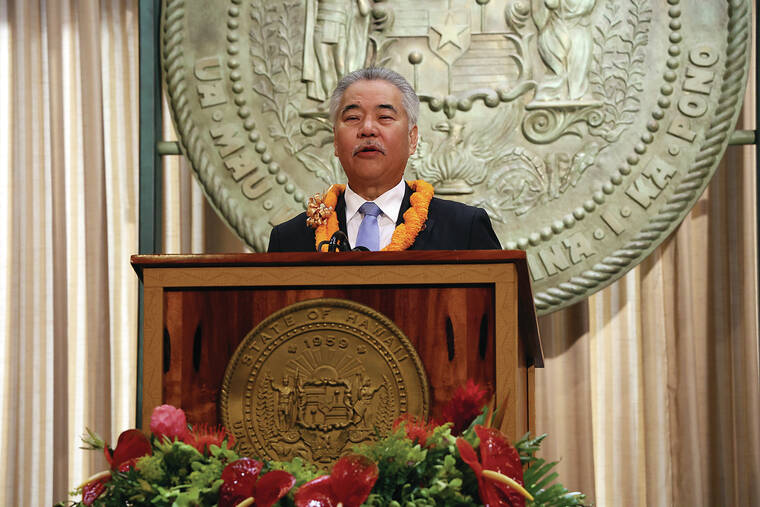Ige proposes $100 tax refund as Hawaii recovers from pandemic
HONOLULU — Hawaii Gov. David Ige on Monday proposed refunding $100 to every taxpayer and dependent as the economy and tax receipts recover from the coronavirus pandemic.
The Democratic governor, in his annual State of the State address to the Legislature, also said he wanted to revive a pre-pandemic proposal to provide preschool for every child in Hawaii.
ADVERTISING
Ige said he was proud of how Hawaii responded to the pandemic as doctors and nurses worked “endless shifts” to provide care and teachers went “above and beyond” to make sure students could learn. He commended people for getting vaccinated and being responsible in their daily lives.
“I see a Hawaii that has been tested and tested over and over again during the pandemic. We may have bent, but we did not break,” Ige said in a speech delivered from the ceremonial room in his office.
In normal years, the governor delivers his annual address from the House floor. He gave his talk remotely to limit the spread of COVID-19.
House Speaker Scott Saiki, a Democrat, told reporters afterward the governor’s tax refund proposal aligns with his chamber’s priority to provide relief to working families.
“So it’s something that we will definitely put on our radar screen, and we’ll consider, and we’ll see if we can factor that into the state budget this year,” he said.
To help families, House leaders have proposed increasing the minimum wage to $18 an hour and expanding the earned income tax credit as well as the food tax credit.
Ige didn’t mention a minimum wage increase in his speech but told reporters afterward he supported hiking it to $18. He said his $100 tax refund would work out to $400 for a family of four. Those with more children would get more.
Ige estimated the total cost would amount to $110 million.
Senate President Ron Kouchi, also a Democrat, said he’s open to the idea of the tax refund but will consider it further once senators get details, said Jacob Aki, a spokesperson for the Senate.
The governor said he wanted to replenish Hawaii’s rainy day fund for emergencies after the state used it up during the pandemic.
He recalled Hawaii was in such dire straits when COVID-19 hit that it had to borrow $750 million to meet payroll — the first time the state has had to borrow money to pay employees. He also said he doubts the federal government will be as generous financially to the states during the next crisis.
“We believe that the $1 billion to the rainy day fund would really prepare Hawaii to be able to stand on its own in response to the next emergency,” he said.
The governor said he also aimed to restore funds to public schools, though he didn’t mention specifics.
To address a shortage of doctors and nurses, Ige proposed expanding the University of Hawaii’s doctor residency program and funding more nursing instructors at the university’s campuses.
He called for spending $400 million on a broadband network that would stretch across the state, including less populated islands like Molokai and Lanai.
The money would come from a combination of federal appropriations and state matching funds.
This year’s state of the state address is Ige’s last because he is limited to two terms in office. The next governor is due to be elected in November and sworn in the following month.
Ige’s voice cracked when he got to the end of his address as he thanked and offered his aloha to the people of Hawaii.
He told reporters he was thinking of those who couldn’t be there in person during his speech.
“How can I express my personal appreciation for so many in our community who have really — without expectation of any kind of acknowledgment — really been willing to support the community and help us get through this COVID pandemic,” Ige said.
Rep. Sylvia Luke, the House Finance Committee chairperson, said people may think nothing bothers Ige because he’s “very logical and engineering.”
“That was the first time in public, I think, he has ever shown his emotion, and I think that shows how hard it was the last several years. And that was very touching,” she said.
Luke said Ige faced “disaster after disaster” in office, from flooding on Kauai to lava erupting from Kilauea volcano to the pandemic.
Saiki said he thought history would treat Ige “much more kindly” than the present.
The House speaker said some criticize Ige for being low-key and methodical but those traits have been an asset.
“In a lot of ways, that is what helped to steer us through these crises — is that he was not reactionary. He was not bombastic,” Saiki said.
“He actually tried to think things through.”


